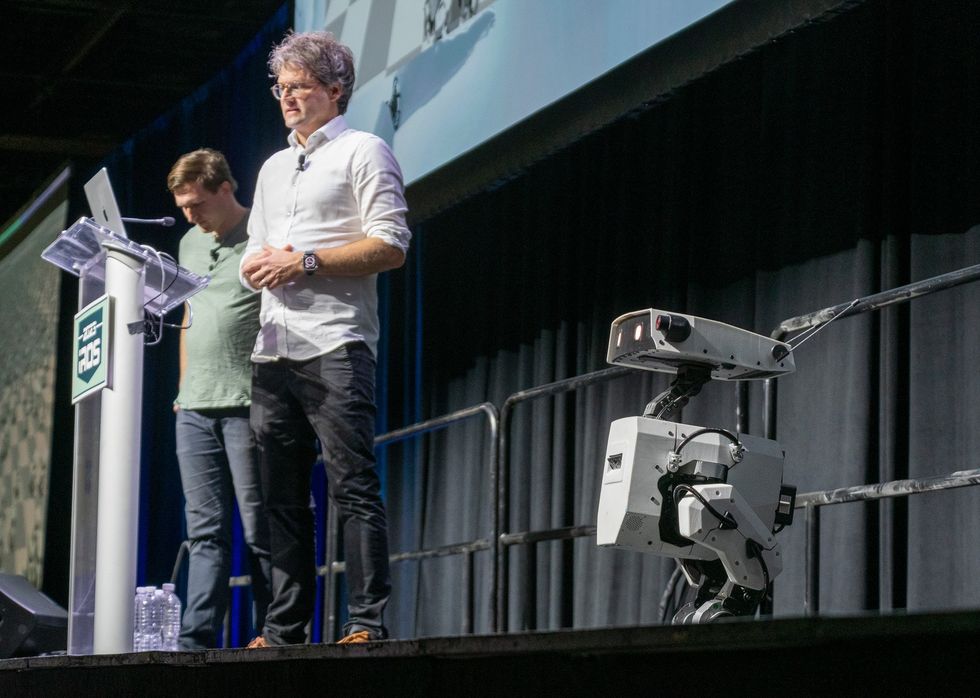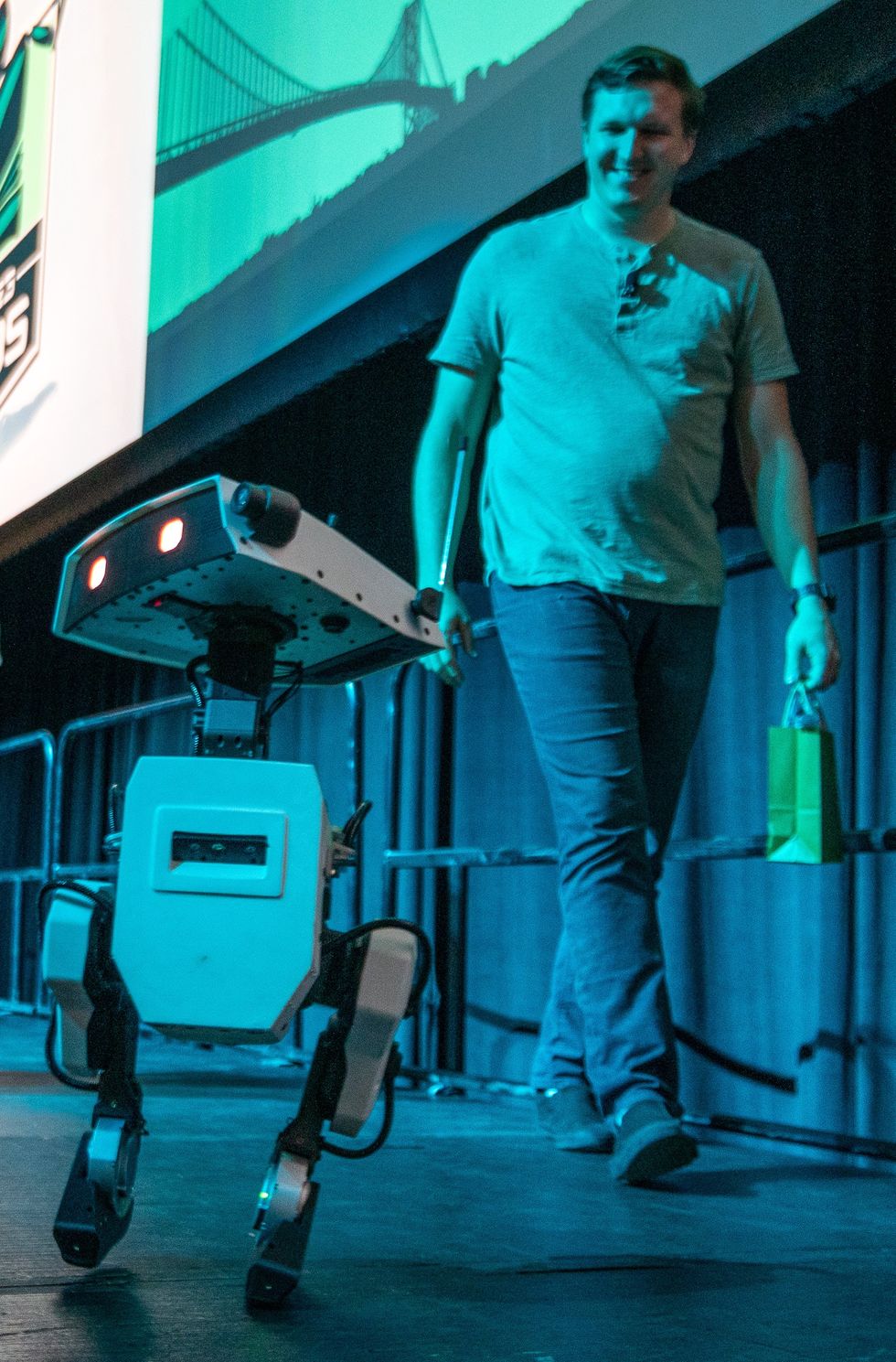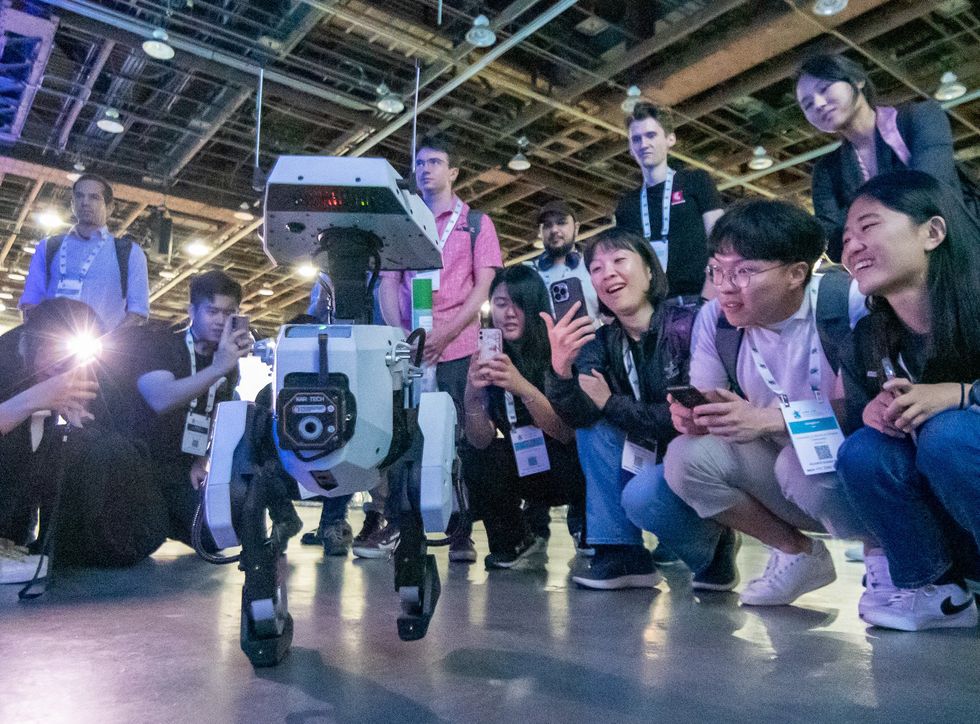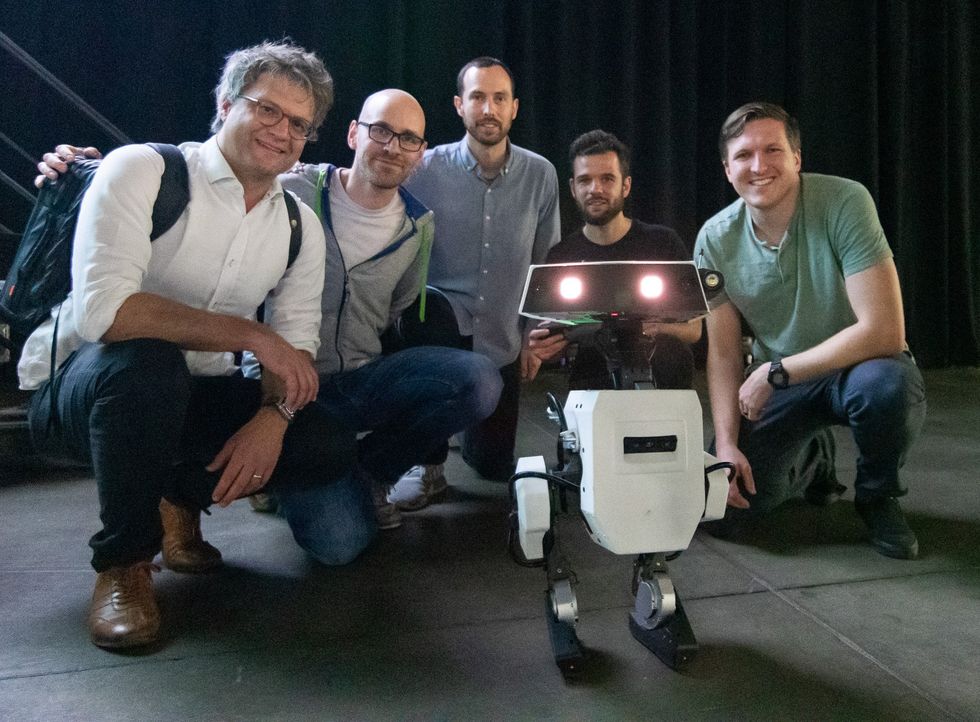[ad_1]
On Wednesday, on the 2023 IEEE/RSJ International Conference on Intelligent Robots and Systems (IROS), in Detroit, a Disney Research staff introduced a model new robotic character throughout their night keynote handle. The lovely robotic packs an infinite quantity of expression into its child-size physique, from its extremely expressive head and two wiggly antennae to its stubby little legs. However what units this robotic other than different small bipeds is how it walks—it’s filled with character, emoting because it strikes in a approach that makes it appear uniquely alive.
Programming robots to maneuver in emotive methods is one thing that Disney is an skilled in, going way back to 1971, with its animatronic Corridor of Presidents in Disney World. As robots have gotten extra superior and extra cellular, although, it’s turn out to be difficult for robotic designers and robotic animators to develop emotive behaviors that each benefit from and are appropriate with robotic {hardware} below real-world constraints. Disney Analysis has spent the final 12 months creating a brand new system that leverages reinforcement studying to show an animator’s imaginative and prescient into expressive motions which are strong sufficient to work virtually wherever, whether or not that’s a stage at IROS or a Disney theme park or a forest in Switzerland.
Disney Analysis
This explicit robotic was developed by a staff led by Moritz Bächer from Disney Research in Zurich. It’s principally 3D printed, utilizing modular {hardware} and actuators that made it fast to design and iterate on, going from idea to what you see within the above video in lower than a 12 months. It has a four-degree-of-freedom head (in a position to lookup, down, round, and tilt), in addition to five-degree-of-freedom legs with hip joints that permit it to stroll whereas balancing dynamically.
“Most roboticists are targeted on getting their bipedal robots to reliably stroll,” says Disney analysis scientist Morgan Pope, who helped current the robotic on stage. “At Disney, which may not be sufficient—our robots could should strut, prance, sneak, trot, or meander to convey the emotion that we want them to.” Disney has animators who’re specialists in making characters convey all of these feelings (and extra) by means of motion, in addition to roboticists who’re specialists in constructing mechanical techniques. “What we attempt to deliver to those sorts of robots is born from our historical past of character animation,” explains Michael Hopkins, a precept R&D engineer at Disney. “Now we have an animator embedded in our staff, and collectively, we’re in a position to leverage their information and our technical experience to create the most effective efficiency we will.”
 Morgan Pope [left] and Moritz Bächer current the brand new robotic at IROS 2023.Evan Ackerman
Morgan Pope [left] and Moritz Bächer current the brand new robotic at IROS 2023.Evan Ackerman
To create an efficient robotic character requires the animators and the roboticists to mix their skills, a course of that may be time consuming and includes quite a lot of trial and error to make it possible for the robotic can convey the animators’ creative intent with out falling over. “Typically, animation instruments don’t have physics constructed into them,” explains Bächer. “In order that makes it exhausting for artists to design animations that can work in the actual world.”
“It’s not nearly strolling,” provides Pope. “Strolling is among the inputs to the reinforcement-learning system, however the different necessary enter is how it walks.”
 Disney’s Morgan Pope helped current the brand new robotic character at IROS.Evan Ackerman
Disney’s Morgan Pope helped current the brand new robotic character at IROS.Evan Ackerman
To bridge this hole, Disney Analysis has developed a reinforcement learning-based pipeline that depends on simulation to mix and stability the imaginative and prescient of an animator with strong robotic motions. For the animator, the pipeline primarily takes care of implementing the constraints of the bodily world, letting the animator develop extremely expressive motions whereas counting on the system to make these motions actual—or get as shut as is bodily attainable for the robotic. Disney’s pipeline can practice a robotic on a brand new habits on a single PC, working what quantities to years of coaching in only a few hours. In line with Bächer, this has lowered the time that it takes for Disney to develop a brand new robotic character from years to simply months.
An enormous benefit of reinforcement studying on this context is that the ensuing motions might be extremely strong. Disney’s system is ready to practice motions again and again whereas making slight adjustments to issues like motor efficiency, mass distribution, and friction between the robotic and the bottom. The system ensures that regardless of the robotic encounters in the actual world, it can know not simply deal with itself, however deal with itself whereas nonetheless emoting, which is vital to the robotic sustaining its character. “This can be a problem for conventional methods,” says Ruben Grandia, an affiliate analysis scientist at Disney Analysis. “Usually, you must hand-program this transition level. However if you happen to put every part collectively in a single simulation and perturb it whereas it tries to maneuver and animate, it will probably decide that time for itself, which has resulted in restoration methods that we see from this robotic that we’d don’t know program.”
Social robots have existed for many years, and even robots not explicitly designed for social interplay normally have some human-robot interplay options in the event that they’re more likely to spend time round individuals. However human-robot interplay can typically be an afterthought for robots which are designed primarily with performance in thoughts. With its robots, Disney has proven simply how a lot a robotic is ready to talk by means of character with out sacrificing performance, and this may be helpful in robotics extra broadly.
“In conditions the place people and robots are shut to one another, conveying emotion and intent might be an necessary characteristic,” explains Georg Wiedebach, senior R&D imagineer at Disney. “So I believe this will also be useful in different purposes the place robots are working subsequent to individuals.”
 IROS attendees meet the Disney robotic.Evan Ackerman
IROS attendees meet the Disney robotic.Evan Ackerman
Whereas it’s straightforward to deal with this particular robotic (look how cute it’s!), the researchers emphasize that what’s necessary right here just isn’t the robotic, it’s the method. “The thought is that it is a platform that’s {hardware} agnostic,” says Bächer. “So if we wished so as to add extra legs, or add arms, or make a completely new character with a very totally different morphology, we will quickly train it new behaviors. The off-the-shelf actuators, the 3D-printed parts, our adaptable reinforcement-learning framework—these can all be utilized to robots which are broadly totally different in how they give the impression of being and transfer. This robotic is a promising first step on that journey.”
The following steps on Disney’s journey contain utilizing this method to develop extra bodily robotic characters, and pushing the bounds of what’s attainable with sooner and extra dynamic motions. “We wish to see what occurs once we get to these limits,” says Disney analysis scientist Espen Knoop, “and be taught what we will do at these limits.”
 The Disney Analysis staff that created the brand new robotic are [from left] Moritz Bächer, Georg Wiedebach, Michael Hopkins, Ruben Grandia, and Morgan Pope.Evan Ackerman
The Disney Analysis staff that created the brand new robotic are [from left] Moritz Bächer, Georg Wiedebach, Michael Hopkins, Ruben Grandia, and Morgan Pope.Evan Ackerman
So far as this robotic goes, the character doesn’t have an official identify, and Disney isn’t able to touch upon the place we’d see it. However based mostly on the way it seems and sounds, we’ve some guesses. And this one little robotic is barely the start—now that they’re a lot simpler to create, we’re hoping to see many extra of those expressive robotic characters from Disney.
From Your Web site Articles
Associated Articles Across the Internet
[ad_2]
Source link



